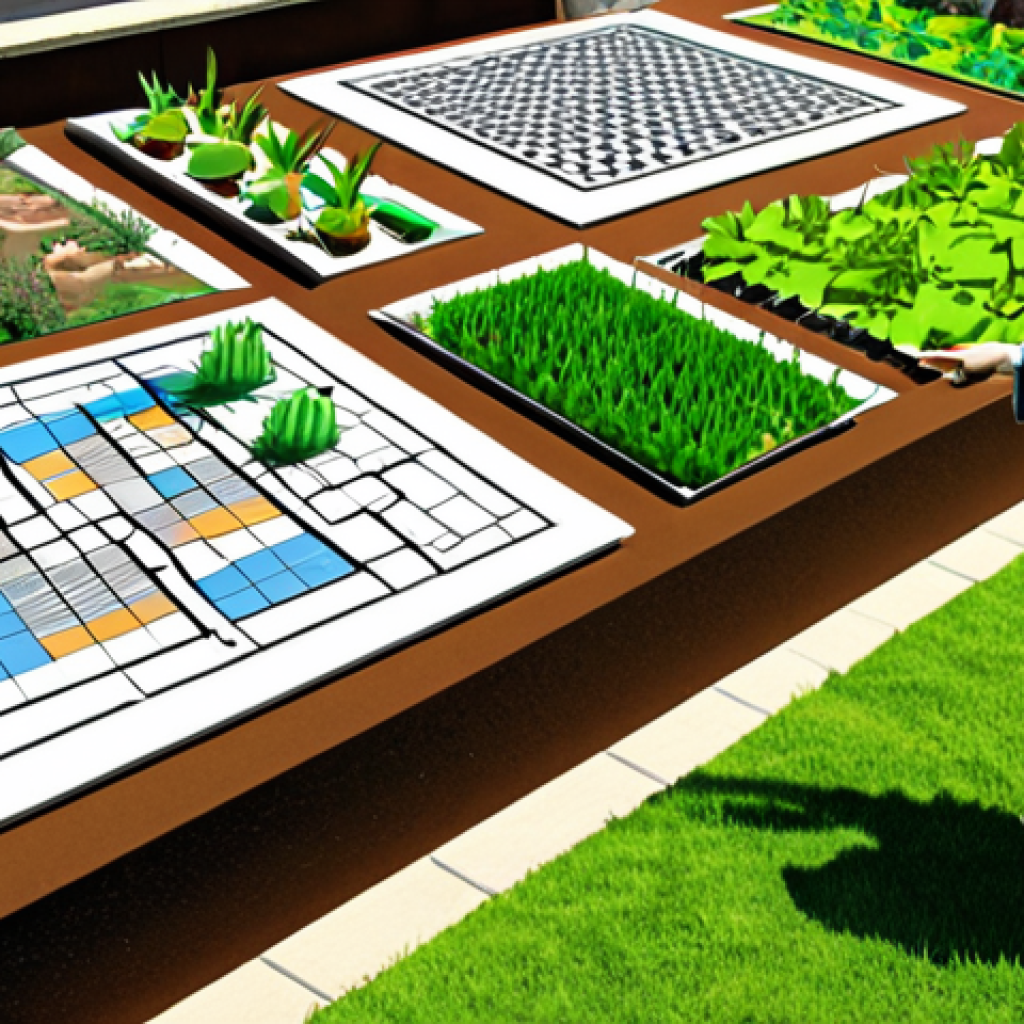Ever felt completely lost, standing at the edge of a vast, beautiful garden, desperate to contribute but utterly unsure where to begin? Becoming a true landscape expert demands so much more than just knowing plants; it’s about mastering the intricate art and science, and fiercely keeping pace with our ever-evolving green spaces.
Honestly, navigating this incredibly dynamic field alone can feel overwhelmingly daunting, especially with the huge shifts towards sustainable and climate-resilient designs.
That’s precisely why a guiding hand, a seasoned mentor, isn’t just an option—it’s an absolute necessity. I’ll tell you definitively how finding that perfect mentor can truly fast-track your journey.
In an era where urban greening and climate adaptation are no longer optional but critical, the landscape industry is transforming at an unprecedented speed.
From cutting-edge biophilic design integrating nature into concrete jungles, to innovative water management systems addressing drought concerns, the breadth of knowledge required is immense.
I’ve personally seen how understanding these complex shifts, which often involve grappling with new technologies like AI-driven design tools or drone-based site analysis, can be a major hurdle.
A mentor doesn’t just share wisdom; they provide a crucial roadmap through the economic and environmental complexities, like securing funding for regenerative projects or navigating local zoning for community gardens, helping you confidently shape the resilient, beautiful landscapes of tomorrow.
It’s about gaining real-world insights into practical challenges, like managing unpredictable weather patterns or sourcing local, sustainable materials within budget, far beyond what any textbook can teach.
It’s a game-changer for anyone truly serious about making an impact.
The Indispensable Edge of Real-World Mentorship

Why Textbooks Fall Short in the Green Industry
Honestly, I’ve spent countless hours poring over academic texts, design principles, and botanical classifications. I’ve gone through all the theoretical knowledge one could possibly absorb about landscape architecture, urban planning, and environmental design.
And while that foundation is absolutely crucial, what genuinely surprised me when I stepped into the professional world was how quickly the neat, tidy concepts from textbooks blurred into the messy, unpredictable reality of a live project.
Textbooks teach you the ‘what’ and ‘how’ in a controlled environment, but they utterly fail to prepare you for the ‘why not’ – why a client might change their mind last minute, why a specific plant might not thrive despite ideal conditions, or how to navigate the intricate web of local permitting and community feedback.
I quickly realized that the true learning began only when I saw these theories put into practice, or more often, when I saw them fall short and learned to adapt.
This real-world gap is precisely where a mentor becomes less of an option and more of a lifeline. They don’t just explain concepts; they share their lived experiences of applying, adapting, and even discarding those concepts in the face of genuine challenges.
Unlocking Practical Wisdom and Industry Secrets
What distinguishes a truly great landscape expert isn’t just their design prowess, but their innate ability to foresee problems, troubleshoot on the fly, and build lasting relationships.
These aren’t skills you learn from a diagram in a book. This is the practical wisdom, the nuanced understanding that comes from years of hands-on experience, facing triumphs and setbacks alike.
I remember vividly a time when I was grappling with a particularly stubborn soil drainage issue on a client’s property. My textbooks offered solutions, but none seemed quite right for the specific microclimate and existing infrastructure.
My mentor, who had probably encountered similar problems a hundred times over, didn’t just give me an answer. Instead, they walked me through their thought process, sharing anecdotes from past projects where they’d tried different approaches, some successful, some not.
They pointed out subtle cues in the topography and existing vegetation that I had completely missed. It was eye-opening. This kind of nuanced insight—the kind that unpacks not just a solution, but the thought process behind it, complete with the subtle cues and potential pitfalls—is priceless.
It’s the industry secrets, the unspoken rules, the shortcuts, and the long roads that only someone who has walked them can truly share. You simply cannot Google this depth of experiential learning.
Pinpointing Your Perfect Guide: More Than Just Expertise
Defining Your Needs and Aspirations
Before you even think about reaching out, take a deep breath and truly reflect on what you hope to gain from a mentorship. Are you looking to specialize in sustainable design, learn the ropes of project management, understand client acquisition, or perhaps even navigate the complexities of starting your own firm?
My journey began with a general desire to “be better,” which, frankly, was far too vague. It wasn’t until I sat down and mapped out my specific professional weaknesses (like, say, my awkwardness in client negotiations) and my long-term career aspirations (eventually leading large-scale urban greening projects) that I could even begin to identify the *type* of mentor who could truly help.
Don’t just look for someone successful; look for someone whose success aligns with your definition of it, and whose expertise directly addresses your current learning gaps.
Be brutally honest with yourself about what you lack and where you want to go. This clarity becomes your guiding compass in a sea of potential mentors.
Where to Seek Out Potential Mentors
The idea of finding a mentor can feel daunting, like searching for a needle in a haystack. But believe me, they are out there, and often, they are more willing to help than you might imagine.
Professional organizations, like the American Society of Landscape Architects (ASLA) or the Landscape Institute in the UK, are fantastic starting points.
Many offer formal mentorship programs, but even attending their events and conferences can provide invaluable networking opportunities. I found my first mentor by attending a local chapter meeting, not even looking for a mentor specifically, but simply trying to meet like-minded professionals.
Academic institutions, too, can be a goldmine; often, your former professors or department alumni can point you towards industry leaders. Don’t underestimate the power of your existing network: talk to colleagues, former supervisors, or even friends in related fields.
Sometimes, the perfect mentor is just one or two connections away. Online platforms like LinkedIn can also be surprisingly effective, allowing you to identify professionals whose work you admire and whose career trajectory mirrors your own aspirations.
Qualities That Define a Great Mentor
It’s not just about finding someone who is an expert; it’s about finding someone who is an expert *and* an effective teacher. From my experience, the best mentors possess a unique blend of qualities.
Firstly, they must have genuine expertise in the areas you want to develop. Secondly, and equally important, they need to be accessible and willing to dedicate time.
There’s no point in having a brilliant mentor who is never available. Thirdly, look for someone who is a good listener, who asks insightful questions, and who challenges your thinking rather than just giving you answers.
My mentor always pushed me to find my own solutions first, guiding me with prompts rather than directives. This approach fostered independent problem-solving, which is arguably more valuable than any specific piece of advice.
Finally, seek someone who embodies integrity and professionalism. You’re not just learning skills; you’re absorbing their professional ethos, so choose wisely.
Crafting the Approach: Making That Crucial First Connection
The Art of the Initial Outreach
This is where many aspiring mentees stumble. You’ve identified someone, you admire their work, now what? A cold email or an awkward introduction can sink your chances before you even start.
The key is to be respectful of their time and to demonstrate that you’ve done your homework. My first attempt at outreach was far too generic, a bland “I admire your work, can you mentor me?” It landed me nowhere.
I quickly learned that a personalized approach is non-negotiable. Mention specific projects or aspects of their career that genuinely resonate with you.
Articulate *why* you believe they would be a great mentor for *you*, linking it to your specific learning goals. Don’t ask for a lifetime commitment upfront.
Instead, suggest a brief coffee meeting, a 15-minute phone call, or an informational interview. Frame it as seeking “advice” or “insights” rather than immediately asking for formal mentorship.
This lower barrier to entry makes it easier for them to say yes and for you to make a strong first impression.
What to Offer and How to Be Respectful of Their Time
Remember, mentorship is a two-way street, even at the initial stage. While you are seeking their wisdom, consider what you can offer in return, or at the very least, how you can minimize their burden.
Be clear and concise in your communication. If they agree to a meeting, come prepared with specific questions. Don’t waste their time by asking things you could easily Google.
Show up on time (or early!), and be prepared to take notes. Offer to pay for the coffee, or if appropriate, suggest taking them to lunch. Follow up promptly with a genuine thank you note, briefly reiterating a key takeaway from your conversation.
Even if a formal mentorship doesn’t materialize immediately, this professional courtesy leaves a positive impression and keeps the door open for future interactions.
This demonstrates your professionalism and respect, making you a far more appealing individual to invest time in.
Cultivating a Thriving Mentorship: Beyond the Initial Spark
Setting Clear Expectations and Goals
Once you’ve established a connection and a potential mentorship begins to form, the next crucial step is to set clear expectations. This isn’t about rigid contracts, but rather a frank, open conversation about what each of you hopes to get out of the relationship.
How often will you meet? What topics will you focus on? What are your short-term and long-term goals for the mentorship?
I found it incredibly helpful to create a loose roadmap with my mentor. We discussed my specific learning objectives for the next six months – perhaps mastering a certain software, or understanding the intricacies of bid proposals.
This keeps both parties aligned and ensures that the time spent together is productive. It prevents misunderstandings and makes the mentorship purpose-driven rather than aimless.
Maximizing Each Interaction: Being Prepared and Proactive
The onus is largely on the mentee to drive the relationship forward. Don’t wait for your mentor to initiate contact or dole out assignments. Be proactive!
Before each meeting, prepare an agenda. What specific challenges are you currently facing? What questions have arisen since your last conversation?
Have you acted on their previous advice, and if so, what were the results? My mentor often said, “Come with problems, not just questions.” This meant I needed to have already attempted to solve issues myself and be ready to articulate where I got stuck.
This approach not only respects their time but also demonstrates your commitment and ability to apply their guidance. The more you put in, the more you will get out.
This is where the true value exchange happens, where abstract advice turns into tangible progress.
Reciprocity: The Two-Way Street of Growth
While the mentor-mentee relationship might seem one-sided at first glance, the most enduring and fulfilling mentorships are those where both parties derive value.
This doesn’t mean you need to pay them or return a favor of equal measure. Instead, think about how you can offer value in ways that are relevant to your mentor.
Perhaps you can assist them with a small task, share insights on a new piece of technology they haven’t explored, or simply offer a fresh perspective on a challenge they are facing.
I once helped my mentor set up a new project management tool that was more efficient than his old system, which he genuinely appreciated. Sometimes, the value simply lies in your enthusiasm, your willingness to learn, and the satisfaction they get from seeing you grow.
Sharing your successes and failures openly also provides them with valuable feedback on their own guidance, enriching their experience as a mentor. It’s a subtle but powerful way to show appreciation and foster a deeper connection.
| Aspect | Learning from Textbooks/Courses | Learning from a Mentor |
|---|---|---|
| Nature of Knowledge | Theoretical, generalized, often outdated quickly. | Practical, current, real-world application, nuanced. |
| Problem-Solving | Structured problems with predetermined solutions. | Complex, unstructured problems; critical thinking development. |
| Skill Development | Conceptual understanding, basic technical skills. | Advanced technical skills, soft skills (negotiation, leadership). |
| Feedback | Limited, often delayed, generic grading. | Immediate, personalized, constructive criticism, direct guidance. |
| Networking | Limited to classmates/instructors. | Direct access to industry leaders and their networks. |
| Career Growth | Provides foundational knowledge for entry-level. | Accelerates career progression, opens doors to advanced roles. |
| Emotional Support | Non-existent. | Guidance through professional anxieties, confidence building. |
Navigating the Bumps: Common Challenges and How to Overcome Them
When Expectations Don’t Align
Not every mentorship blossoms into the lifelong, deeply impactful relationship you might envision. Sometimes, despite your best efforts, expectations just don’t align.
Perhaps your mentor is busier than anticipated, or their advice doesn’t quite fit your situation. I once had a short-lived mentorship where the mentor’s style was very directive, and I was looking for more collaborative problem-solving.
It just didn’t click. It’s easy to feel disappointed or even frustrated in such situations. The key is to recognize that this is a normal part of professional development.
Not every person you connect with will be the perfect mentor for your entire journey. It’s crucial to acknowledge the mismatch rather than forcing a fit.
Instead of dwelling on it, focus on what you *did* learn from the experience, even if it was just learning what kind of mentorship *doesn’t* work for you.
It’s all part of the growth process.
The Importance of Clear Communication and Boundaries
Even in a seemingly perfect mentorship, challenges can arise if communication isn’t crystal clear or if boundaries are blurred. Your mentor is a busy professional, and while they are generously donating their time, it’s not an unlimited resource.
I’ve seen mentees inadvertently overstep by demanding too much time, asking for favors unrelated to their development, or not respecting their mentor’s schedule.
This can quickly lead to resentment and the premature end of the relationship. It’s vital to discuss frequency of meetings, preferred communication methods, and even the scope of advice.
For instance, is your mentor comfortable reviewing your actual project work, or are they purely there for high-level career guidance? Establishing these clear boundaries early on prevents misunderstandings and ensures that the relationship remains mutually respectful and sustainable.
Remember, a polite “Are you available for a brief chat this week, or is next week better?” goes a long way.
Knowing When to Transition or Seek New Guidance
Just as plants need different nutrients at different stages of growth, your mentorship needs might evolve. What was once invaluable guidance for a junior designer might not be sufficient for someone looking to lead a large department.
It’s perfectly normal for mentorships to transition or even conclude gracefully. This isn’t a failure; it’s a natural progression. You might find you’ve absorbed all you can from a particular mentor in a specific area, or your career trajectory might shift.
Recognizing when it’s time to transition, or even to seek a new mentor for a different phase of your career, is a sign of maturity. Express gratitude for the time and wisdom shared, and perhaps offer to stay in touch informally.
Sometimes, a mentorship doesn’t end but simply morphs into a professional friendship or peer relationship. This fluidity is a hallmark of a truly dynamic and adaptive professional journey in the landscape industry.
Specialized Growth: Leveraging Mentorship for Niche Expertise
Deep Dives into Sustainable Practices and Emerging Technologies
The landscape industry is undergoing a profound transformation, driven by climate change, technological advancements, and a renewed focus on sustainability.
While general knowledge is important, true leadership often stems from deep, niche expertise. This is where a mentor becomes incredibly powerful. I realized how much I was missing when I started to specialize in regenerative landscape design.
My mentor, who had been an early adopter of these principles, guided me through the complexities of bioretention systems, native plant ecologies, and even the grant application process for large-scale sustainable projects.
They weren’t just theoretical; they showed me successful case studies, introduced me to industry specialists, and helped me understand the practical challenges of integrating these innovative solutions into real-world scenarios.
Similarly, for emerging tech like AI in design or drone mapping, a mentor can demystify the tools, explain their real-world applications, and help you navigate the learning curve much faster than trying to figure it out alone.
This specialized guidance is invaluable for staying ahead in a rapidly evolving field.
Mastering Business Acumen and Client Relations
For many landscape professionals, the jump from being a skilled designer or technician to managing a successful business or leading a team is immense.
This is where many struggle, as these skills are rarely taught in design school. A mentor with strong business acumen can be a godsend. They can provide insights into everything from pricing strategies and contract negotiations to building client relationships and managing project budgets.
I distinctly remember my mentor walking me through the nuances of client communication – how to listen actively, manage expectations, and even deliver difficult news with grace.
They taught me the importance of understanding the client’s business goals, not just their aesthetic preferences. This kind of mentorship goes beyond design and delves into the operational realities of running a thriving practice, which includes navigating economic downturns, understanding market shifts, and making strategic decisions that ensure longevity and profitability.
It’s about equipping you not just to design beautiful spaces, but to build a sustainable career doing so.
The Full Circle: Preparing to Pay It Forward
Recognizing Your Own Growing Expertise
One of the most profound moments in my career came when I realized I was no longer just the mentee, but that I had accumulated a wealth of knowledge and experience that others were actively seeking.
It’s a subtle shift, but one that’s incredibly rewarding. You’ll start noticing younger professionals approaching you with questions, seeking your perspective on challenges, or simply looking to understand how you navigated certain career junctures.
This is your cue. It’s a sign that your own expertise has matured, that your experience has grown into valuable wisdom. This realization isn’t about ego; it’s about acknowledging your growth and the responsibility that comes with it.
It means you’ve successfully navigated some of the very paths you once sought guidance on, and now you possess the insights to light the way for others.
The Rewards of Guiding the Next Generation
Becoming a mentor isn’t just about giving back; it’s a powerful way to continue your own learning and growth. The act of articulating your knowledge, breaking down complex processes for someone else, and guiding them through their own challenges often solidifies your understanding and even reveals new insights.
I’ve found that explaining my approach to a mentee often helps me refine my own processes and identify areas where I can still improve. Beyond that, there’s an immense personal satisfaction in seeing someone you’ve guided flourish.
It’s a unique form of legacy, knowing that you’ve contributed to the development of the next generation of landscape experts. The landscape industry, like any profession, thrives on the continuous transfer of knowledge and experience.
By paying it forward, you’re not just helping an individual; you’re strengthening the entire community, ensuring that the art and science of shaping our green spaces continue to evolve and inspire for years to come.
Wrapping Things Up
So, there you have it. Mentorship isn’t just a nice-to-have; it’s a non-negotiable cornerstone for anyone truly aspiring to excel and make a real difference in the landscape industry. My own journey has been profoundly shaped by the guidance of those who walked the path before me, sharing not just their knowledge, but their very wisdom and experience. It’s a relationship that transcends textbooks, offering direct access to the nuanced realities of our incredible field. Embrace it, cultivate it, and watch how it transforms your professional life, equipping you not just with skills, but with the confidence and clarity to truly thrive.
Good to Know
1. Networking is Key: Actively attend industry events, conferences, and local chapter meetings of professional organizations like the American Society of Landscape Architects (ASLA) or the Landscape Institute. These are prime grounds for organically meeting potential mentors who share your passion.
2. Be Specific in Your Ask: When you finally reach out, clearly articulate what specific aspects of their work you admire and what precise guidance or insights you are seeking. Generic requests often get lost in the shuffle.
3. Always Come Prepared: Before any meeting with your mentor, have specific questions or current challenges ready to discuss. Their time is incredibly valuable, so demonstrating your preparedness and focus makes every interaction impactful.
4. Follow Up Thoughtfully: A prompt, genuine thank-you note after each meeting, briefly reiterating a key takeaway or action item, demonstrates professionalism and deep respect for their time and generosity.
5. Mentorships Evolve: Remember, it’s perfectly normal for a mentorship relationship to transition or even conclude. Your professional needs will change over time, and recognizing when to seek new guidance for different stages of your career is a sign of maturity and continuous growth.
Key Takeaways
Mentorship offers an indispensable edge, bridging the gap between theoretical knowledge and the messy, unpredictable realities of the landscape industry. Unlike textbooks, a mentor provides practical wisdom, problem-solving strategies, and crucial industry insights forged from years of experience. To find your ideal guide, you must first define your specific needs and aspirations, then strategically seek out professionals within industry organizations, academic networks, and your existing connections. When making the crucial first connection, always personalize your outreach, clearly state your intentions, and demonstrate profound respect for their time. Once a mentorship begins, cultivate it by setting clear expectations, being proactive in your preparation for each interaction, and understanding that the relationship thrives on a subtle yet powerful form of reciprocity. Challenges like misaligned expectations or blurred boundaries can arise, but clear communication and knowing when to transition ensure the relationship remains beneficial. Ultimately, leveraging mentorship for specialized growth, from sustainable practices to business acumen, can accelerate your career significantly. As you grow, recognizing your own developing expertise and preparing to pay it forward by guiding the next generation completes the full circle, enriching both your journey and the entire profession.
Frequently Asked Questions (FAQ) 📖
Q: With the landscape industry changing so rapidly, especially with new tech and climate concerns, why is a mentor truly indispensable now more than ever?
A: Oh, it’s like trying to navigate a dense jungle with just a map from 10 years ago! Seriously, the sheer pace of change—think AI-driven design tools popping up weekly, or suddenly needing to understand hyper-local microclimates for drought-resistant planting—it’s dizzying.
A mentor isn’t just a guide; they’re someone who’s already tripped over those roots and knows the shortcuts. I remember wrestling with my first major project that integrated a rainwater harvesting system; the textbooks didn’t tell me about the specific regional grants or the local council’s bizarre permitting process.
My mentor, who’d been there, done that a dozen times, just casually dropped a name or a tip that saved me weeks of headache and potentially thousands in redesigns.
They connect the dots between the grand vision and the grubby, practical realities. It’s that blend of foresight and lived experience that makes them absolutely non-negotiable in this wild new world.
Q: The article mentions mentors offering insights “far beyond what any textbook can teach.” Could you elaborate on what kind of practical, real-world challenges a mentor helps you navigate that aren’t covered in typical education?
A: Absolutely! Textbooks are fantastic for foundational knowledge, but they rarely prepare you for, say, a freak hailstorm wiping out your newly planted saplings mid-project, or trying to source enough sustainable, locally-milled timber when everyone else is also scrambling for it.
A mentor shares the nitty-gritty, the stuff you only learn through sweat and tears. I’ve seen experienced professionals help me understand the subtle dance of client expectations versus budget realities, or how to negotiate with a contractor when their “minor delay” impacts your entire schedule.
They’ll tell you which nurseries are actually reliable, or how to really get a community garden approved by a notoriously difficult neighborhood board, not just the legal steps.
It’s the unspoken rules, the gut feelings, the “this happened to me once, here’s how I fixed it” wisdom that turns theoretical knowledge into actionable, resilient solutions.
They prepare you for the beautiful chaos of real-world design.
Q: How does having a seasoned mentor specifically help someone make a tangible impact in urban greening and climate adaptation projects, especially given their complexity?
A: This is where a mentor truly shines and transforms you from an enthusiast into an effective agent of change. These projects—think large-scale urban parks designed to mitigate heat islands, or complex wetland restorations for flood control—aren’t just about plants and aesthetics; they’re about policy, community engagement, and securing significant funding.
A mentor has often walked that exact path. They can guide you through the maze of grant applications, introduce you to key stakeholders in city planning or environmental agencies, and teach you how to articulate your vision in a way that resonates with diverse groups, from city councils to local residents.
I distinctly remember my mentor helping me refine a proposal for a community rain garden; their advice on phrasing the long-term economic benefits to the homeowners, not just the ecological ones, was the exact pivot that got it approved.
They teach you to think strategically, to anticipate hurdles, and to build the kind of robust, interconnected networks you need to truly make a lasting, climate-resilient difference.
It’s about turning big ideas into tangible, green realities.
📚 References
Wikipedia Encyclopedia
구글 검색 결과
구글 검색 결과
구글 검색 결과
구글 검색 결과
구글 검색 결과





